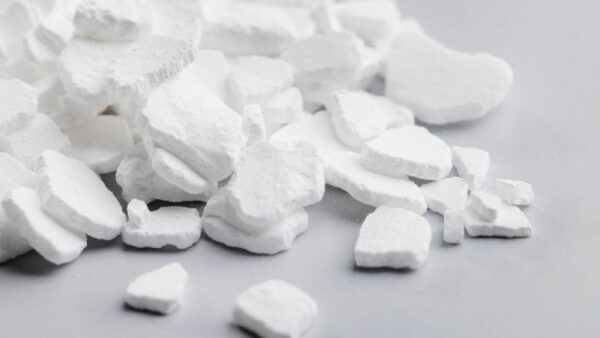Calcium Chloride – A versatile basic chemical, used in a variety of industrial and commercial applications
Calcium Chloride is a truly versatile raw material and therefore has a wide range of applications. You may have to salt the driveway to melt the ice on a freezing winter day, then experiment with your home-made cheese, which tastes better and better every day, then fill your humidifier, and use the same chemical, Calcium Chloride
This article explains why Calcium Chloride is useful, both at home and for the industry.
Calcium Chloride is available in flake, solution, pellet or granular form, the following properties make it so versatile.
Properties of Calcium Chloride
Water-holding capacity
A molecule of Calcium Chloride contains up to six molecules of water, so it can be said that it has a high water-holding capacity. Calcium Chloride can remove moisture from the air or extract excess water from certain solutions. Due to its hygroscopic (water-holding) capacity, it helps harden concrete. It is also used in wastewater treatment as it reduces the water content of the sediment from sewage. Calcium Chloride is also known as an additive to fire extinguishers.
Frost resistance
The Calcium Chloride 30% solution freezes at -42 degrees, so it is safe to say it’s the most effective de-icing agent.
Heat capacity
Calcium Chloride in solution with water, heat is released, which accelerates the process of melting ice.
Calcium Chloride displaces sodium
Sodium is the number one cause of salinity in soil. Calcium Chloride in the soil can reduce the sodium content and increase the calcium content, so it can also be used as a fertilizer.
It dissolves well in water and has a salty taste
This property is useful in the food industry, especially in cheese making.
And now let’s look at the areas/industries in which Calcium Chloride can be used.
Uses of Calcium Chloride
De-icing
It is the best de-icing agent due to its low freezing point and heat-generating abilities. Not only does it melt ice effectively, but it also doesn’t adversely affect plants, making it a much better alternative to traditional sodium chloride. The Calcium Chloride can be used to prevent icing (before snow and rain) and afterwards (de-icing roads). It is sodium-free and doesn’t leave a residue, so it is an important tool for protecting motorways and roads from icing in Hungary. It is available in the form of granules and solutions for de-icing. Experience has shown that Calcium Chloride solution can be used more efficiently than granules because less of it is enough and it can be more evenly distributed. Depending on how low the temperature is and how severe the snowing/icing is, the amount to be applied is between 40 and 100 millilitres per square metre.
Dust control
Calcium Chloride is the most widely used treatment for dust control in the world. More than 50 years of experience shows how effective it is as a dust suppressant on motorways, dirt roads, tennis courts, riding stables, parking lots and other surfaces, creating a cleaner and safer environment. The excellent water-holding property of Calcium Chloride is used in this process. When using it on these surfaces, it binds water, forms a thin layer of liquid and holds dust down. This liquid layer evaporates slower than water, so it stays on the surface even when the weather is dry. It is inexpensive and using it once a year is usually enough. It is applied in the form of a solution. While an average of 2,5 litres per square metre is used for the first treatment, 1,5 litres per square metre is sufficient for the next treatments.
Dehumidifier
If the humidity in our home exceeds 40 to 60 percent of the healthy value, we need to dehumidify. High humidity can cause mould, help the growth of pathogens, and can even be responsible for the rusting of metal objects and the damages to the furniture. Thanks to its hygroscopic properties, Calcium Chloride absorbs moisture. It can be used in store-bought dehumidifiers, but you can even make your own dehumidifier at home. The benefit is that Calcium Chloride flakes are inexpensive and available. Calcium Chloride is also used for industrial dehumidification in 20 kg moisture absorber bags. No electricity is required during humidification, and it is completely chemical-free.
Cheesemaking
In the process of cheese making, the presence of free calcium ions is essential for the coagulation of milk. If for some reason the milk doesn’t contain the right amount of calcium ions, it is necessary to replace them, and the easiest way is to use Calcium Chloride. Treating the milk at high temperatures (pasteurization) can lead to a loss of calcium ions, or if the animal has been grazed in a calcium-deficient area. Calcium supplementation may also be required in sheep’s and goat’s milk. Ten litres of milk require only 1-2 grams of Calcium Chloride, more than that can result in a bitter taste.
Additive for the food industry
It is not only used in the manufacture of cheeses but is also known as E509. Calcium Chloride is used primarily as a flavour enhancer and solidifier due to its salty taste. In addition, it is effective in preserving the freshness of fruits, vegetables and salads by treating the produce with a Calcium Chloride solution after slicing, which seals the cells where it was cut so that the freshness of the food is maintained. Calcium Chloride has more beneficial physiological effects than sodium chloride. It gives the beer a softer, sweeter character, plus it helps precipitate proteins and increases stability.
Industrial uses
It can also be used as an accelerator for cement, and it also helps to solidify concrete. However, it should be noted that due to its corrosive effect, it’s not applicable to reinforced concrete structures. Calcium Chloride is often used in the production of plastic, and it is even an important additive for fire extinguishers.
Due to its favourable properties, Calcium Chloride can be useful at home, and it is an extremely important raw material in the industry, of which millions of tons are used worldwide every year.


